Expose: Mercy Ships
A Nurse’s Journey of Healing
Interview by Mackenzie Lowry
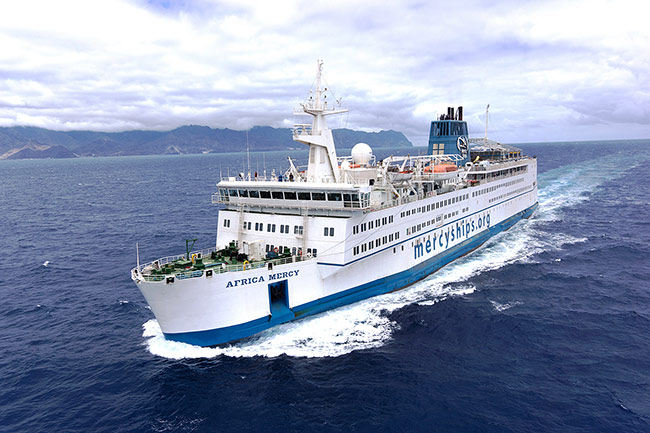
Mercy Ships is a global charity organization that runs a fleet of hospital ships to bring healthcare to developing nations all across the world. The organization has helped over two million individuals in need since it’s founding in 1978. Today, Mercy Ships’ biggest aid is Africa Mercy, a 153 x 23.7 meter ship with over 400 crew members taking care of patients in Africa.
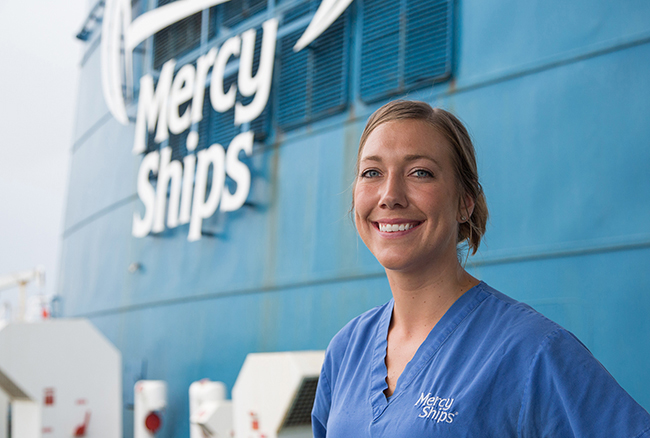
Nurse, Jaclyn Blievernicht
One of those crew members was Jaclyn Blievernicht. The 26 year old nurse is a hard working Wisconsin native, who followed in her mother’s footsteps by becoming a nurse. She was inspired to take a leap of faith to use her learned skills to help people who really needed it, by spending six months working on a medical ship in Africa. Jaclyn was away from everything and everyone she had ever known.
Before Mercy Ships, you went on a mission trip to the Dominican Republic?
Jaclyn Blievernicht: That was January 2014, with a different organization and it was a week long surgical mission trip. There were two surgeons that went with us, an OBGYN and a general surgeon. We arrived and screened the patients (previously selected for surgery) the day after we got there. We did four days of long surgery – boom, boom, boom.
I speak Spanish fluently. I had been to Mexico prior, not with a mission trip but with a school trip. In the Dominican Republic patients are different, healthcare is different, everything is different, except that you are both humans, you have the same general needs. It was really cool to be able to cross some boundaries by just knowing the language.
We were in a mission hospital where a lot of people come for treatment. I really enjoyed that experience. They are so grateful that you’re there. I thought, “This is great! I am young and I love being able to go. I don’t have a family yet and I don’t have a boyfriend now. I’m not really tied down”. After that trip I thought I would love to do something long term. I think that was kind of a jumping off point for me.
That’s how you found Mercy Ships?
I had heard of Mercy Ships before, but I was looking at a couple different things. One of my friends applied for Mercy Ships and she said, “You should go too” and I said, “Okay.” It just kind of seemed right. There were a lot of ICU positions available and that’s what I do here at home. So, I applied and ended up going.
You lived in Wisconsin your whole life. What was it like to live so far away ?
It was hard because I missed my family and I missed my friends. Normally the ship has internet, but it’s very small. You can’t watch videos, you can’t FaceTime, but you can write e-mails and make phone calls. In Madagascar this past year, they got broadband internet and we were able to FaceTime. So that was actually a blessing. I felt like it was way easier to keep in touch with people at home, so that was nice.
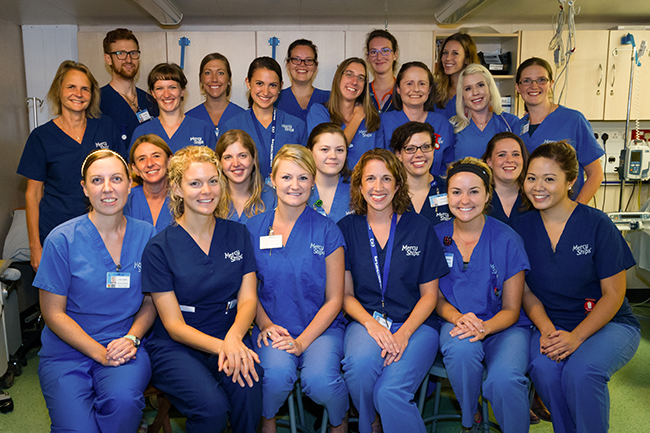 D Ward Nurses
D Ward Nurses
Also, having so many awesome people around you makes it easier. Since it’s a volunteer thing, it’s not like work. When you have a job, there are so many people around you who are just like, “Oh, I have to work today”. They’re just dramatic about everything, they don’t love their job, they don’t want to be there a lot of the time. Being on the ship, was totally different. Pretty much everybody wanted to be there, because you volunteer to be there. It made a big difference. You’re similar to them because you are volunteering, you just want to help people in general, and you have that heart to help. You are surrounded by all those people and have that support system like you’re all in this together.
Some days you would miss things. Some days would be a little crappier because you miss home or because it’s so hot and you’re just think, “Oh, this sucks, I wish I was in the snow in Wisconsin right now!” But overall, I feel like what made it OK, was being able to have that support system around you. The other great thing were the patients. They are so appreciative of us being there, and helping them. They were just great.
Was it was a tight community on the ship? I guess it has to be, if you’re living on the boat for so long.
Yeah, exactly. Most people have to live in a room with other people. It’s pretty rare that you get your own room. I think maybe some of the surgeons or higher up people get their own room. I was in a six person room, so I automatically had five people that I got to know. You have somebody to eat dinner with you. You pretty much do everything on the ship, so you get to know a lot of people. You have to eat food with them and you have to go to two community meetings a week to stay updated on ship happenings. You just do a lot together.
People come in and out because they are there for different durations. Is that hard?
Some people are there long term. It’s almost harder to get to know those long term people because they have their long term buddies. For me, it wasn’t terrible because I was on the ship for six months. So you meet some people, some people leave, new people come. At the end, it’s just emotionally wearing to make an effort to meet new people all the time. You do that when you’re starting college, when you’re maybe starting a new semester and you have new classes, or when you’re starting a new job, but it’s not constant. It was constant on the ship. You have to keep telling yourself, Okay, keep talking, keep welcoming people. By the end it was getting harder. I was just tired. It was emotionally exhausting. I was ready to come home, just to see my family.
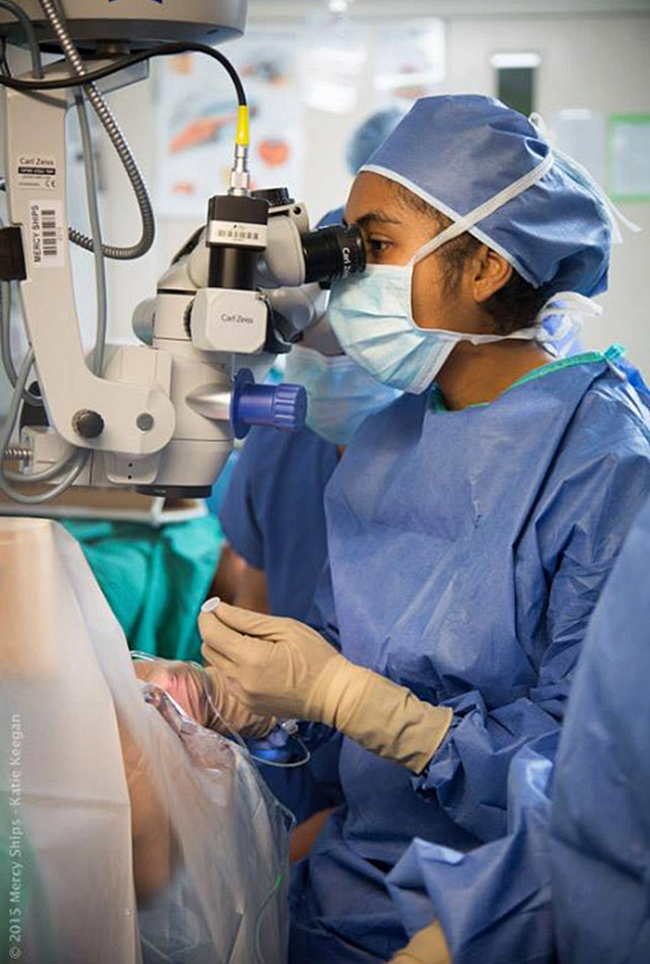
What was a typical day like for you on the ship?
My sleep was pretty good because I was on deck three, which is the same deck as the hospital. There are no windows on deck three, so you get nice, solid sleep. Noise is sometimes an issue, but not usually. I would get up at 5:20am on Monday, Wednesday, and Friday. I would go for a run with some of my friends at 5:30am. It’s too hot to go out for a run after that. Then I would come back and shower, and get breakfast with some people. I worked quite a few evening shifts, so in the morning I would do a little reading, sometimes go sit in one of the common areas, or the café area. There’s actually a Starbucks café on board. It’s not quite the Starbucks that you have in the States, but it is Starbucks coffee. They make lattes and stuff, so sometimes I would get a latte and hang out in the café for a while, later take a nap and then eat lunch. I would go to work after that. If I worked in the evening, I would work from 2pm until 10:30pm. Then I would walk back to my room and get ready for bed.
What was the hardest adjustment of living on a ship?
I think for me it was the bathroom. It’s not bad, it’s pretty clean with a normal toilet and shower. The bathroom is small in general and it’s a vacuum system. To flush the toilet, it vacuums it out. In the shower it vacuums the water out. Taking two minute showers, the water would rise up and the bathroom would flood. I think it was hard to adjust to. I just wanted a normal bathroom and a big shower where I could easily shave my legs. It was fine.
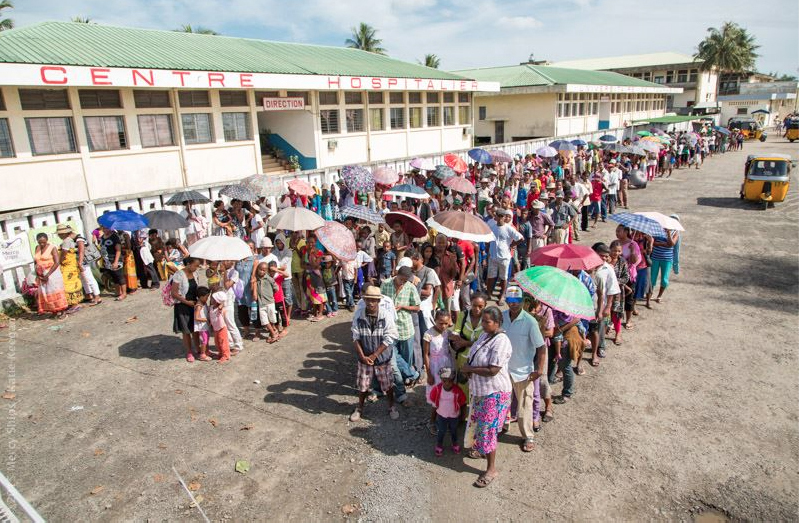
You guys on Mercy Ships have worked with some incredible cases and have changed a lot of lives. Going into the experience did you have expectations?
Honestly, I remember before I left I didn’t have a lot of expectations, because I was busy leading up to it and it came so fast. I was getting ready to go and people were asking me “What do you think it’ll be like?” or “How is this going to be?” I felt like I was just going, and it will be what it is. “What if you hate it?” If I hate it, it’s six months. I can do it, it’s fine.
I didn’t know how I would react to patients with big tumors and big deformities, because you know how you always look at people like, “Oh, look at them”. You try to not show it on your face, you try to act normal, but it’s hard to do. I remember watching a Mercy Ships video where this girl talks about that. The interviewer asked this nurse “Do you think of them differently? Do you look at them differently?” And she said, “No, because at first maybe you recognize it, but then you just see the person for who they are.” I realized this is so true. I don’t even remember really responding to them differently. I do remember seeing somebody in the hallway with a huge tumor and thinking, “Whoa, that’s a huge tumor!” because his was just so big. Patients would come in the door and they would look disfigured sometimes. I don’t know if it’s because the people you’re with just love people in general, but you can respond with love to them. You can show them, “I care about you. Even if people outside this ship treat you differently, will not look at you or treat you like a person, we will”.
I think I wasn’t sure how I was going to deal with that, but it was kind of just second nature. The crew and I would say, “I am so happy you’re here! Welcome! Tuma sua!” (That means welcome.)
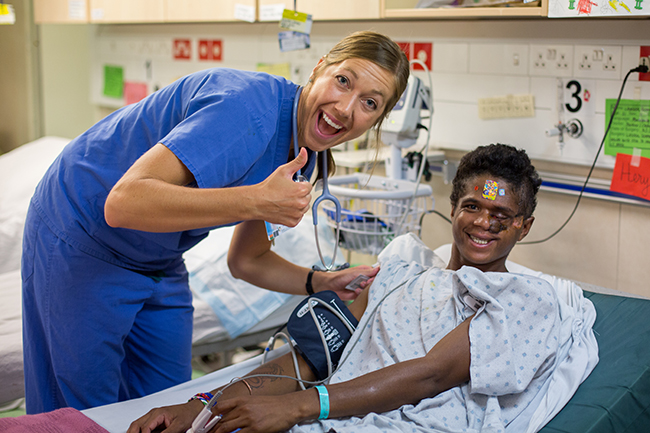 Jaclyn Blievernicht and Hery pause for a photo during a blood pressure check.
Jaclyn Blievernicht and Hery pause for a photo during a blood pressure check.
I think that’s a good way to go into it.
Yeah, that’s what someone said. I was worried before I left. People were asking me all these questions and I would say “I don’t know! I’m excited to go and I’m packing my bags and I’m leaving! I’m all set.”
Were the prospective patients afraid of receiving treatments because they didn’t understand the procedures or had different beliefs about medicine?
I feel like because they came to the ship they already had to have a certain level of belief in the treatments. Most of the people who come to the ship have pretty significant problems. Some people come with a hernia, but some people have massively deformed legs, or facial tumors, and cleft lips. I feel like for them to even come to the ship is a big step, especially because a lot of the people in Madagascar come from far away.
Madagascar is really big, it’s the fourth largest island in the world. Our screening team screened in different places around the country. Some people traveled for two or three days to get to the ship. I think maybe they heard from word of mouth about other people who had success with us, or maybe their family said, “You’ve had this tumor years. This is free, try it.” The fact that they actually wanted to come to the ship is a big thing. I feel that by the fact we were welcoming them with open arms and just loved them from the beginning, they would have less fear about the treatments in general.
There are pictures on the wall when they walk into the ship and when they come down the halls. They can see the before and after pictures like, his leg was crooked and his leg is now straight because we fixed it. All throughout the ship they’re seeing what we can do, and that we actually do what we say we’re going to do.
I know that there was some rumor that people thought that we may be taking their internal organs. I don’t remember where that came from, but we were like, “What?! No! Absolutely not!”. I feel like in general, people were pretty comfortable with us. We never had to call the doctor and say, “He doesn’t want to take this medicine because he thinks it’s going to kill him.” or “He doesn’t believe in it.” Patients were pretty receptive to it all, in general.
But there may be a lot of people out in the countryside or people even in the city who have seen the commercials who may be like, “I don’t know about that…” and they don’t even come. It’s a big step just to come to the ship. It’s a big white ship with all these foreigners working on it.
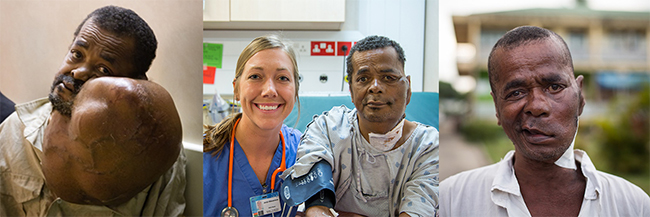
What was it like to see their reactions when treatments were completed?
Their reactions were awesome! The biggest thing was how grateful they were, especially people who have suffered for a long time. A baby who has a cleft lip and we repair it at nine months old, the mom is grateful, but the baby is never going to remember. A forty year old woman with a cleft lip, she’s been deformed her whole life. To give her a mirror after surgery, for her to see her repaired lip for the first time is really awesome. The patients may be still a little groggy after surgery, but they see the improvements and just have this huge smile. They’re just happy.
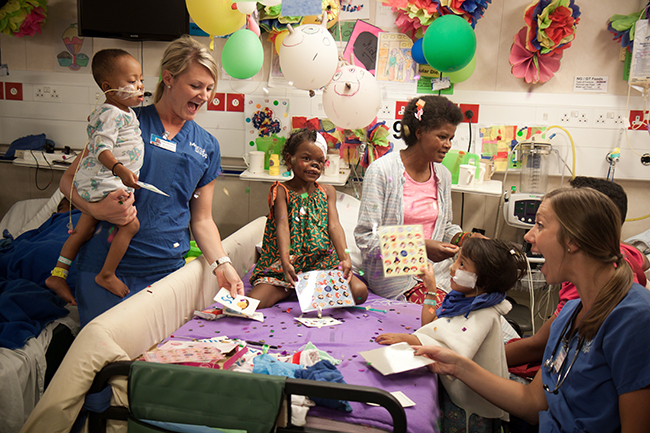 Heather Morehouse Ward Nurse, holds Bienvenue while playing with Mioty and Jaclyn Bleivernicht Ward Nurse.
Heather Morehouse Ward Nurse, holds Bienvenue while playing with Mioty and Jaclyn Bleivernicht Ward Nurse.
We make new noses for people. People that have lost their nose, especially from noma the flesheating disease. There were two guys that were the same age, Jacques and Stani. I think Jacq had his nose done first. For three weeks they looked horribly disfigured because they had skin pulled down over there faces to form a nose and the skin was attached to the scalp. They had their heads all wrapped up and didn’t look normal at all. I think Jacq’s surgery was six days ahead of Stani’s surgery. Jacq came back for his second surgery and they pulled the flap back and cut it so he would have a nose. He was lying in his bed when Stani and his uncle came over and were just standing at the side of the bed, with their hands behind their back, just staring at him intently. I asked the translator what they were saying and he said, “Jacq, your nose looks great, it’s awesome!” Then Stani asked the interpreter “When is my surgery? I want to look normal again. I want my nose!” He was so excited.
What is Noma, the flesh eating disease?
It usually occurs when people are infants or in early childhood. It eats the flesh away and then it’s done. Almost 90% of the victims die from the disease. For Jacq and Stani to be alive at 18 or 19 years old with a hole in their face was miraculous. The fact that we were able to give them a nose was pretty sweet.
You learned a little bit of their language, did you have to learn it in training?
No. There’s no language training required, but you have to speak English to be on the ship. Mercy Ships hires translators when the boat gets to the country. There’s really no need for any language skills except English, on the boat. The interpreters like to teach you the local language, and once you get to know the patients they like to teach you too, by talking back and forth. Most of the nurses have a little notebook they pull out of their pocket to try to keep track of words. It’s always so different to just be able to say things to your patient, even if it doesn’t make a lot of sense. The word “strong” in Malagasy is matatika, so my friend Martha was telling a patient, “Matatika bey!” It is one letter of difference from the word “naked.” So she was saying “You’re very naked.” It’s not always flawless, but we try.
Did you use body language to communicate a lot?
Body language, definitely. Even if you know a word, it helps. You can get the point across very well. When I want to ask “Does this patient have pain?”, I can just say “Marai?” and say it like a question. Then I can say, “Little, big?” etc. It’s a lot of expressions with your face and hand signals. Without the translators it would be pretty much impossible. It would be so hard to take care of the patients without them.
Did the patients teach you some languages?
Definitely. They were some of the brightest people I feel like. They know Malagasy, which is the Madagascar language, they all know French, and some English. A lot of them are learning Italian, German, and Chinese. They just love these languages. It’s crazy.
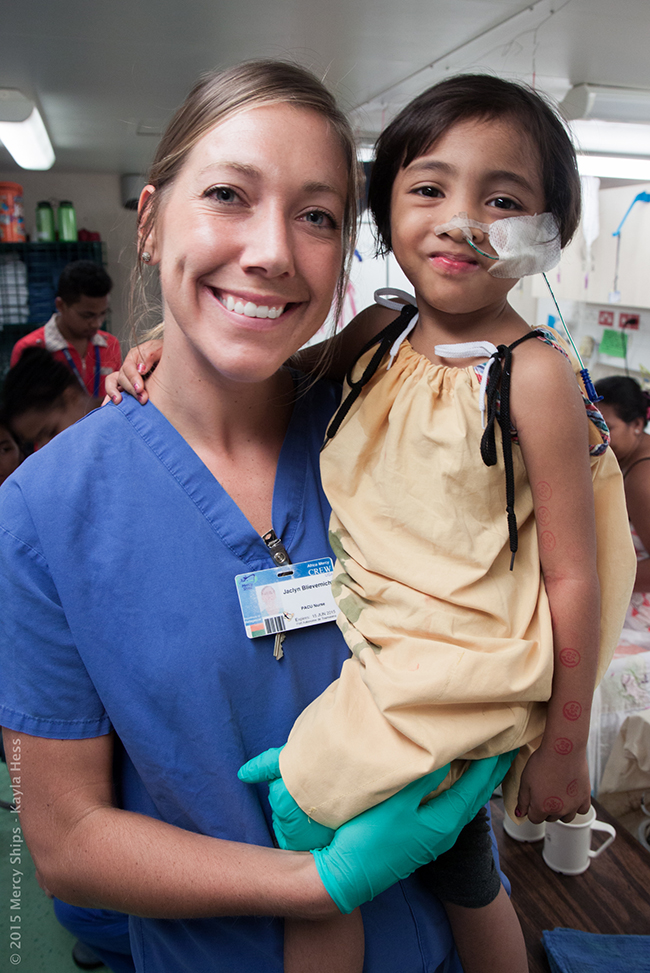
Tsanta plays on D ward with nurse Jaclyn Blievernicht.
You spent most of your time on the ship. Did you learn a lot about the culture through the people?
I feel like I learned a decent amount about the culture from our day crew, especially because they speak English. They could explain to you cultural things taking place, like “Oh, is it normal when two people are talking face to face, and when a Malagasy person walks through, they’ll bend really low and put their arm down to show that they’re passing through?” They would answer “Yeah, everybody does that, it’s normal. It’s like a thing of respect, getting out of their way, showing people where they’re going”.
Living on the ship you can maybe learn about the culture, but I feel like I didn’t learn as much as I could have, if lived off the ship. I feel like the patients try to teach you their customs, try to show you what their culture and life is like, even though they’re in this foreign society with white washed walls, and different toilets. It’s just so different from their normal life to be on this ship. There are no windows. They’re not outside much. Once you got to know the longer term patients, they would get so comfortable with you, they would try to communicate those things to you.
Did the ship sail around or stay docked in Madagascar?
During my term we spent the entire time in Madagascar. The hospital is only functioning when you’re in port because if you’re moving, everything’s shifting. I wasn’t there when the ship sailed from South Africa to Madagascar, but a couple of my friends were on the ship and said during dinner the plates would be sliding back and forth on the table. Chairs would slide across the floor sometimes. So there’s no way to actually operate the hospital when the ship is sailing. That’s why they do a certain amount of months of field service, sail somewhere else, do maintenance, and then get the hospital all set up again for the next field service.
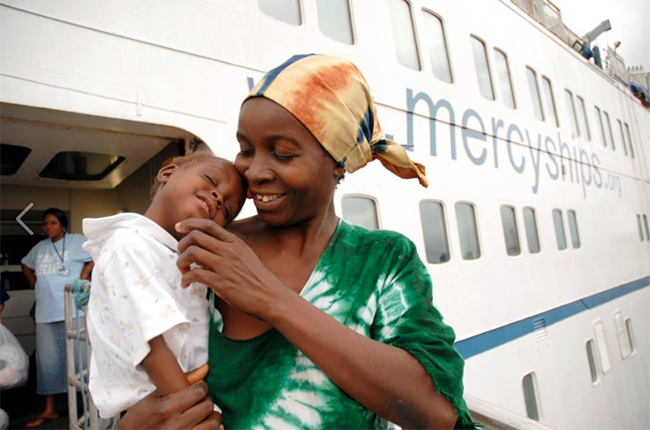
All your life, normal was daily life in Wisconsin and after a while normal became your daily life on the ship. Now being back at home, are there things that don’t seem as normal anymore?
To me, it’s actually kind of sad how normal home feels. I think where I see the biggest thing is probably in the hospital. I just started working yesterday – so yesterday I worked a little bit, today was my first day on my own with patients again. There’s just so many supplies we have that we just throw away or things that we don’t reuse that we did reuse in Madagascar. It just seems so wasteful. I know that some of it we have to do, but part of me is like why do we have to do this? Can’t we just wash these basins and reuse them instead of throwing every one of them away?
Another perspective: I’m an American woman. I love to shop. I go to the store and think, “Whoa, I want to buy all this stuff.” I put things in my cart like I normally would and then I think, “I don’t need any of this. Yeah, I need shampoo, but do I need this shampoo? No. I could probably find shampoo for half the price that would work fine.” It just kind of brings more of a perspective to how I spend my money.
I know that I am so blessed. I live in the richest nation in the world and I have the whole world at my fingertips, pretty much. I can make good money, I can buy whatever I want to buy. Then I went there and I met such beautiful, intelligent people, that loved to learn and want to work, but there’s minimal opportunity for them. It’s sad because I feel like just being born into the family I was born into, the country I was born into, I was so richly blessed.
When I really think about it, there’s just the hugest difference in how we live, how much money we make, what we spend our money on, but when I think about the person, the person is exactly the same as me. You know that every human in the world is going to have the same need for food, shelter, and love in general. After being with the people I worked with for six months, it’s cool to just see that they’re the same as me. They love me and I love them. We want the same thing for their country, we want to help people. I think I have more of a global perspective, which I hope will make me think more about how I spend my money and how I spend my time.
Photos © Mercy Ships, Jaclyn Blievernicht, Katie Keegan, Justine Forrest, Deb Louden, Kayla Hess
